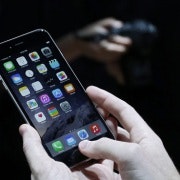The expanding definition of the word "phablet"
This week, Apple rolled out the largest smartphone in its history: the iPhone 6 Plus, with a screen measuring 5.5 inches on its diagonal. While Apple officials talked up the next-generation phone as bigger and better than ever, they studiously avoided using one word: "phablet."
But in the tech world, the iPhone 6 Plus will fall squarely into the "phablet" category: larger than your typical smartphone but smaller than a tablet like the iPad. Apple is now competing with other phablets on the market, such as the Samsung Galaxy Note 4 and the LG G3.
Apple is not alone among mobile device makers in spurning the word phablet, and with good reason. While the term has gained acceptance among techie types over the past few years, it has from the very beginning been accompanied by an air of derision. These supersize devices can seem rather ridiculous to use, and the "phablet" epithet conveys that ridiculousness.
The playful blending of "phone" and "tablet" into "phablet" apparently occurred to several observers independently. On Twitter, the earliest documented use of "phablet" came in September 2009, when software engineer Sloan Bowman used it to refer to the Nokia N900, a device that combined the functionality of a smartphone and a hand-held computer—though by today's standards, it is a bit too small to be considered a phablet.
"Phablet" apparently did not appear in a tech publication until June 1, 2010, when Ian Scales wrote about the 5-inch Dell Streak for TelecomTV: "Is it a phone? Is it a tablet? No, it's a phablet." Mr. Scales did not come up with the term himself, however. A few days earlier, he had been introduced to the term by Dan Warren, director of technology for GSMA, a U.K.-based consortium of mobile operators.
Mr. Warren told me that he had recently decided to purchase a Dell Streak and self-deprecatingly started calling it a "phablet" when faced with ribbing from his colleagues. He then quipped about his "phablet" in a conversation with Mr. Scales—"with tongue in cheek and a grin on my face," Mr. Warren said.
From those early days, "phablet" continued to catch on, reaching prominence with the release of the Galaxy Note. Then the backlash began, as many tech pundits decried it as an ugly word. When the American Dialect Society met for its 2012 Word of the Year proceedings (which I oversaw), "phablet" won the dubious honour of Least Likely to Succeed.
And yet "phablet" has managed to succeed, despite its awkwardness, in part because no one has come up with a decent alternative. If no other choice presents itself, Apple and its competitors may have to accept "phablet" grudgingly after all.
This article was originally published in the Wall Street Journal. Reproduced with permission.
















